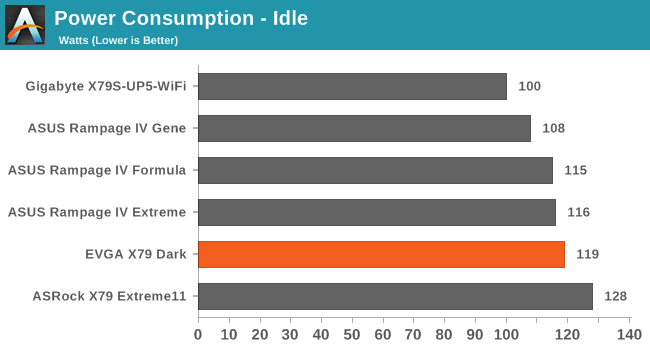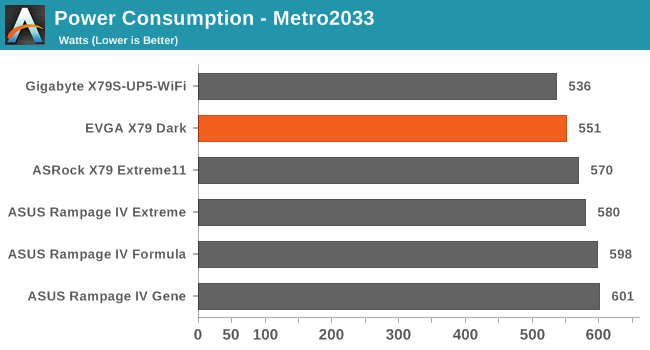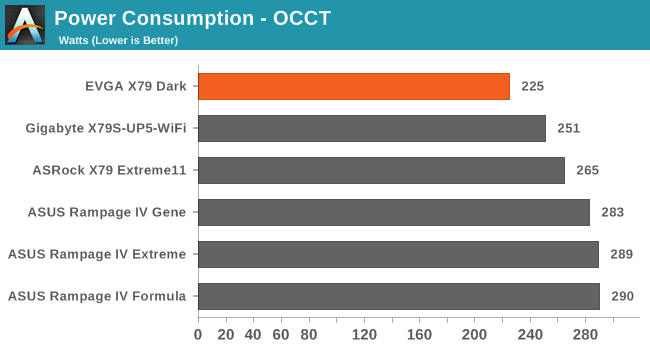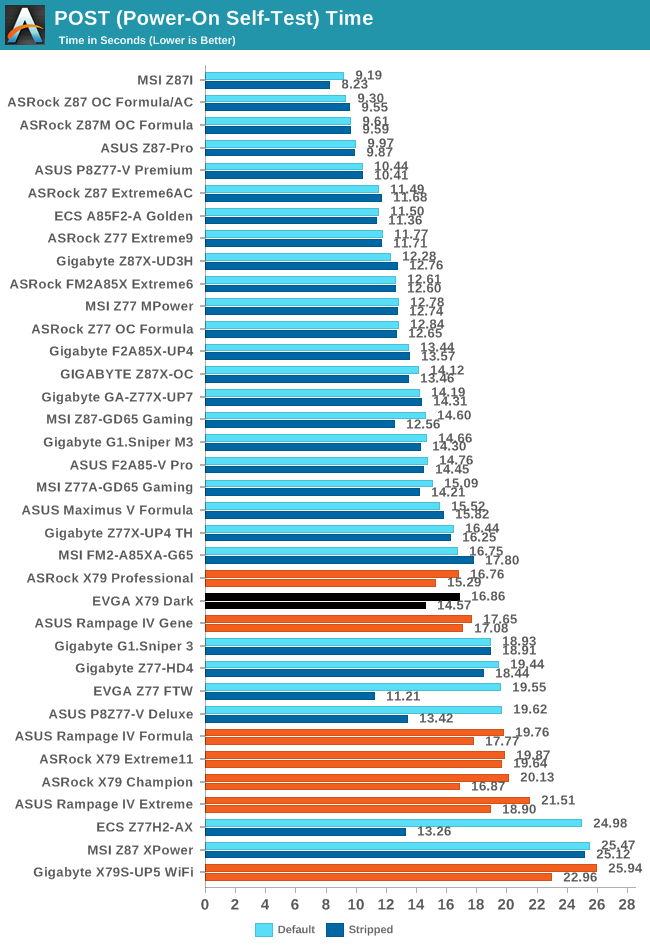EVGA X79 Dark Review
by Ian Cutress on October 23, 2013 10:00 AM EST- Posted in
- Motherboards
- Intel
- EVGA
- X79
Many thanks to...
We must thank the following companies for kindly providing hardware for our test bed:
Thank you to OCZ for providing us with 1250W Gold Power Supplies.
Thank you to G.Skill for providing us with memory kits.
Thank you to Corsair for providing us with an AX1200i PSU, Corsair H80i CLC and 16GB 2400C10 memory.
Thank you to ASUS for providing us with the AMD GPUs and some IO Testing kit.
Thank you to ECS for providing us with the NVIDIA GPUs.
Thank you to Rosewill for providing us with the 500W Platinum Power Supply for mITX testing, BlackHawk Ultra, and 1600W Hercules PSU for extreme dual CPU + quad GPU testing, and RK-9100 keyboards.
Thank you to ASRock for providing us with the 802.11ac wireless router for testing.
Test Setup
| Processor |
Intel Core i7-4960X ES 6 Cores, 12 Threads, 3.6 GHz (4.0 GHz Turbo) |
| Motherboards | EVGA X79 Dark |
| Cooling |
Corsair H80i Thermalright TRUE Copper |
| Power Supply |
OCZ 1250W Gold ZX Series Corsair AX1200i Platinum PSU |
| Memory | Corsair Vengeance Pro 2x8 GB DDR3 2400 10-12-12 Kit |
| Memory Settings | XMP (2400 10-12-12) |
| Video Cards |
ASUS HD7970 3GB ECS GTX 580 1536MB |
| Video Drivers |
Catalyst 13.1 NVIDIA Drivers 310.90 WHQL |
| Hard Drive | OCZ Vertex 3 256GB |
| Optical Drive | LG GH22NS50 |
| Case | Open Test Bed |
| Operating System | Windows 7 64-bit |
| USB 2/3 Testing | OCZ Vertex 3 240GB with SATA->USB Adaptor |
| WiFi Testing | D-Link DIR-865L 802.11ac Dual Band Router |
Power Consumption
Power consumption was tested on the system as a whole with a wall meter connected to the OCZ 1250W power supply, while in a dual 7970 GPU configuration. This power supply is Gold rated, and as I am in the UK on a 230-240 V supply, leads to ~75% efficiency > 50W, and 90%+ efficiency at 250W, which is suitable for both idle and multi-GPU loading. This method of power reading allows us to compare the power management of the UEFI and the board to supply components with power under load, and includes typical PSU losses due to efficiency. These are the real world values that consumers may expect from a typical system (minus the monitor) using this motherboard.
While this method for power measurement may not be ideal, and you feel these numbers are not representative due to the high wattage power supply being used (we use the same PSU to remain consistent over a series of reviews, and the fact that some boards on our test bed get tested with three or four high powered GPUs), the important point to take away is the relationship between the numbers. These boards are all under the same conditions, and thus the differences between them should be easy to spot.



The EVGA X79 Dark seems very efficient in CPU loads, requiring only 225W total system power compared to 250W+ of other motherboards. This might be down to the 3.7 GHz issue of the BIOSes, however.
Windows 7 POST Time
Different motherboards have different POST sequences before an operating system is initialized. A lot of this is dependent on the board itself, and POST boot time is determined by the controllers on board (and the sequence of how those extras are organized). As part of our testing, we are now going to look at the POST Boot Time - this is the time from pressing the ON button on the computer to when Windows 7 starts loading. (We discount Windows loading as it is highly variable given Windows specific features.) These results are subject to human error, so please allow +/- 1 second in these results.

Due to the Marvell controllers, the standard boot time of the EVGA feels longer than it should – our 16.86 seconds result felt longer than it is, and cutting the controllers out speeds up the process by a couple of seconds. Ideally we would like a sub-12 second result for this test.










23 Comments
View All Comments
JellyRoll - Thursday, October 24, 2013 - link
They lost Shamino :) They should have never let him go.Gen-An - Thursday, October 24, 2013 - link
Yep. Mr. Peter Tan was the reason why the X58 EVGA boards were so good, but once Asus got him, it was all over.DarkStryke - Friday, October 25, 2013 - link
They lost almost the entire motherboard engineering team to Sapphire like two years ago, and Shamino / Tan moved to ASUS. Their boards have been mediocre since, living off the hype fumes of the X58 glory days when they were one of the best boards out there.fluxtatic - Friday, October 25, 2013 - link
Interesting, as I was sort of under the impression that Sapphire had bailed back out of the motherboard market again a while back. I picked up a Sapphire Pure E-350 a couple years ago, as it was the right combination of price and features (even though documentation and support were fairly awful.) It's been a solid board, running my home file server. Last I looked, though, there were no Sapphire boards to be found. Maybe they just bailed on the US market?jasonelmore - Friday, October 25, 2013 - link
sapphire still makes AMD Graphics cards, and i'm sure they were recruited for them and not their motherboards lol.itchyartist - Wednesday, October 23, 2013 - link
good look for this motherboardpowruser - Thursday, October 24, 2013 - link
Crazy that they're asking $400 for this board. No ALC1150? ... Really? It's not like X79 is a brand new chipset, they've had plenty of time to figure out how to make a proper motherboard. Disappointing to say the least.defiler99 - Thursday, October 24, 2013 - link
I bought one of these and had nothing but trouble with it, despite using three different sets of RAM, etc, etc. I came to the conclusion that the board just wasn't ready to go, and got an ASUS X79-DELUXE instead. So far, working 1000% better.P4spooky - Friday, October 25, 2013 - link
Not to mention $50 cheaper! Shame the hardware looks impressive but don't have time to mess around with buggy bios issues.jasonelmore - Friday, October 25, 2013 - link
i dropped EVGA a couple of years ago and went to Asus simply because of their Custom PCB Video cards, and awesome motherboards.. EVGA was great, but they lacked a lot of custom and high performance components. All of their graphics cards were basicly a refrence design with a evga sticker.Here recently, they've heard the outcry and started making custom coolers, and maybe 1 or 2 custom pcb cards, but their engineering department pales in comparison to Asus's.
EVGA does win in the warranty and customer service departments. I loved that about evga, however i would have to rma my cards about once a year due to failing components. Now since i've went to custom pcb cards with better cooling and better parts, i haven't had to RMA once.. And if i ever have to RMA with Asus, i dread it, because they're customer support is awful.